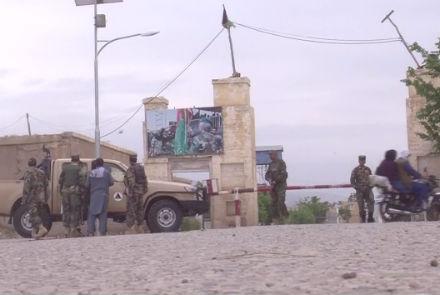More than 24 hours after Friday afternoon’s deadly attack on the Afghan National Army’s 209 Shaheen Corps Headquarters in Balkh province local and international media were still waiting for the National Unity Government (NUG) and the ministry of defense to release details on the exact casualty toll.
Leaked numbers indicated the toll was anywhere between 135 and 180 while some even said the number of soldiers killed could be in the hundreds.
Shortly after the siege on the military base ended, government said eight soldiers were dead and then raised this figure to 11. On Saturday morning, the ministry of defense issued a statement that said at least 100 dead and wounded. No specifics were given.
One would think that government would stay on top of an incident of this magnitude – and at the very least dedicate a media-liaison team to field phone calls and questions and disseminate correct and updated information to the press.
This should be the norm, not only to keep the country and the world informed, but also in keeping with government’s so-called commitment to freedom of press and the decree on access to information. It should also be an automatic gesture to honor the victims – in this case, all those fallen soldiers.
To simply shut down all official channels of communication on such a matter and ignore requests to release the official casualty figures is nothing short of censorship.
The lack of real details caused a barrage of posts on social media, especially among the journalist community in Afghanistan, with many taking to twitter and Facebook and slamming government for its silence.
One twitter user refused to mince his words and said: “CONFIRMED: Afghan Army lying about its losses in the latest Taliban attack. Real number of losses suffered by Afghan Army likely over 100.”
Another journalist called it a massacre and stated simply government “has refused to confirm the death toll.”
If this is the case, what does it say for President Ashraf Ghani and CEO Abdullah Abdullah’s “commitment” to freedom of press?
This is not a new trend – it has been going on for months. However, it comes on the heels of the MOAB bombing of Achin in Nangarhar where nine days after the U.S Forces dropped the “Mother of All Bombs” solid information from government has still not been forthcoming.
Only on Friday – day eight – did TOLOnews journalist Karim Amini manage to get near the blast site. However, the closest he could get, while under heavy military escort, was 300 meters away.
Another recent incident that springs to mind is that going back less than two weeks when Ghani publically dismissed a TOLOnews journalist after refusing to answer a question at a press conference.
This move was met with sharp criticism from the Afghan journalist community and media supporting organizations, which said Ghani’s treatment of journalists was not standard and that it was suffocating freedom of press in the country.
The irony of this was that in the wake of a public outcry, the presidential palace issued a statement and reaffirmed government’s commitment to protecting freedom of press in the country.
It also used the opportunity to highlight government’s achievements in the press sector. However, their lack of action in the wake of Friday’s deadly incident sends out a completely different message.
Sadly, the feeling on Saturday among many journalists in the country was one of despondency – with many questioning the validity of anything government says.
One senior journalist, Sami Mahdi said: “If government is not willing to provide critical information on how many soldiers were killed in Friday’s attack – when we all know the toll exceeds 100 – what else is government covering up?
“We have the law and we have the presidential decree on access to information, but in reality we do not have access to basic information about incidents such as the attack on the military hospital in Kabul and yesterday’s massacre,” he said.
Parwiz Shamal, another journalist pointed out that under this government the country has seen a big change in access to information – and that government offices send out a lot of information on a daily basis but its selective information and “it’s very general and no details are given.”
He said that when the media requests specific information, they are met with silence. “All doors are locked. No one answers.”
“They (government) ignore us!”
He also said: “Government is good at putting out its own propaganda but not good when it comes to putting out real news.”
Working in Afghanistan for journalists is no easy task – especially with the constant threats they face from insurgent groups. With this in mind, one would think that a government committed to freedom of press would at the very least be transparent with its information.
Reports emerge around the clock, from countries far and wide, about fatal incidents - be they accidents or attacks. The difference is these incidents are mostly always dealt with timeously and professionally by the government concerned.
No European government would ever try to hide a death toll in any terrorist attack and even in war-torn Middle Eastern and north African countries, details are distributed on time.
So what makes Afghanistan any different? Surely government should respect its media, people and, in this case, its fallen soldiers, and make public the real casualty toll.
This is by no means too much to ask of any government!

